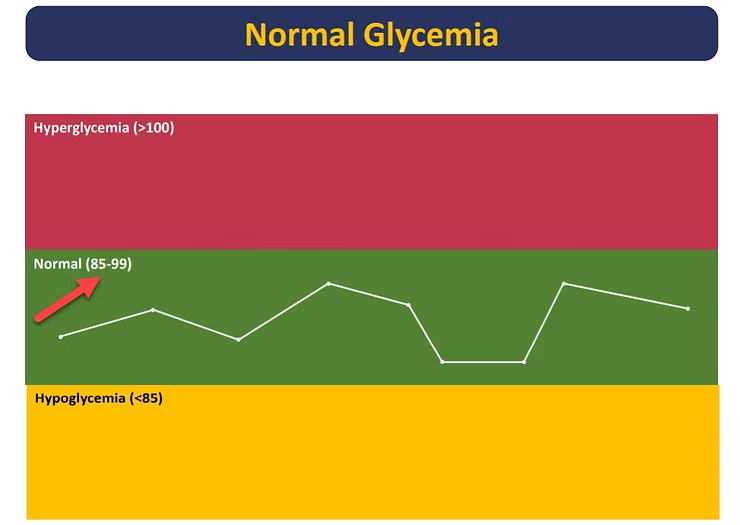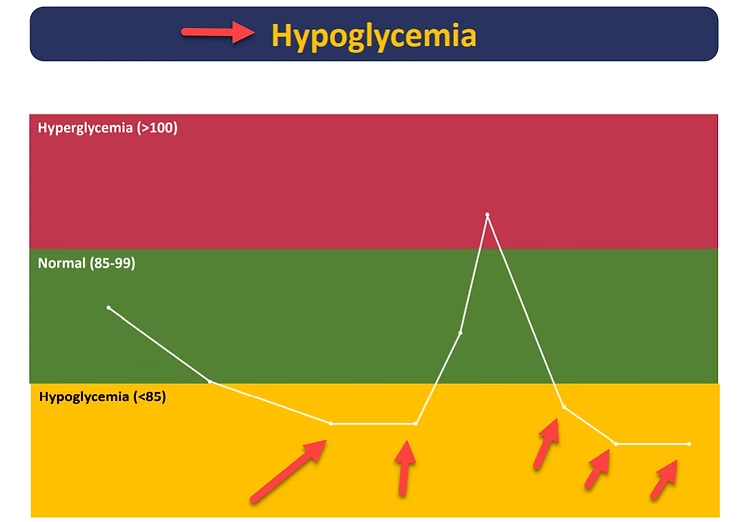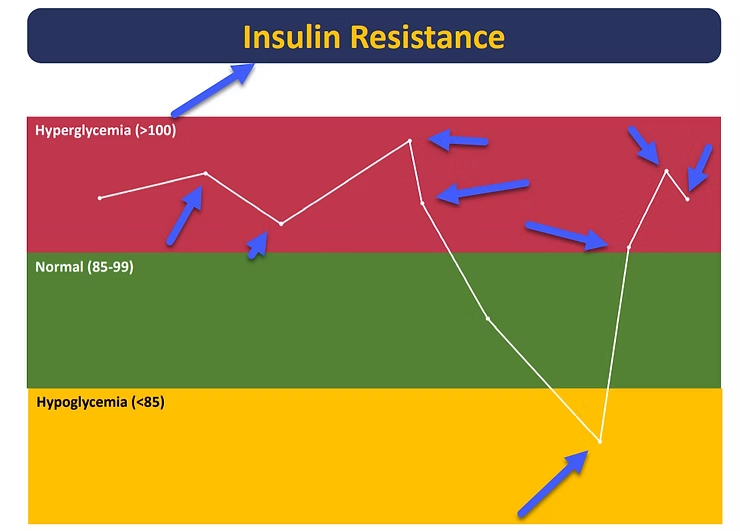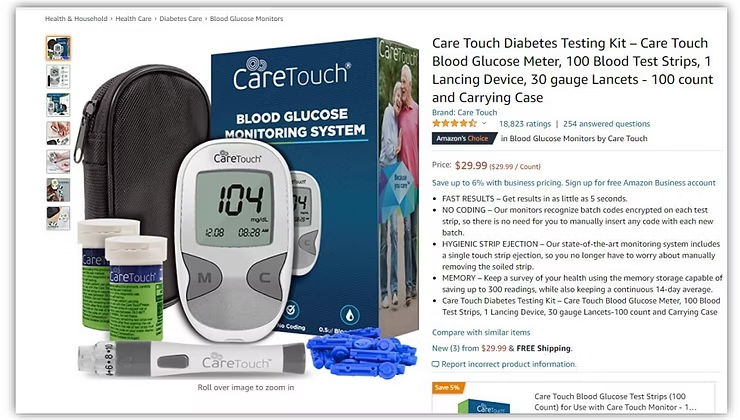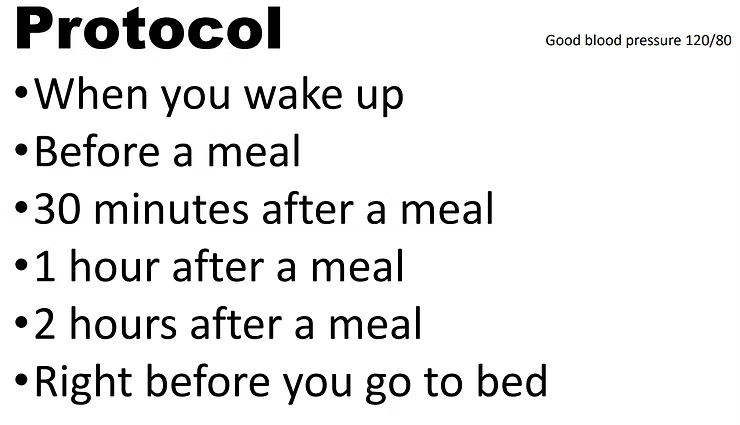Today I’d like to talk about sugar regulation, including the conditions hypoglycemia and hyperglycemia. There is a lot of research related to this topic, so we’ll also go over some clinical data, and hopefully give you some skills you can incorporate into your own life.
If you have a problem and you have dysglycemia, poor sugar regulation will be contributing to your problem. You may even be unable to recover completely from your issues. It does not matter what quality of care you receive, if your sugar regulation is out of control you will likely not recover.
What Does A Normal Glucose Response Look Like?
One thing should happen when you eat: your hunger pains go away. That’s it. The follow signs that you may have a sugar regulation problem might manifest after eating:
- You get more energy
- Shakes
- Brain fog
In contrast, normal glycemic control should include the following:
- You should wake up with lots of energy
- Wake up with an appetite
- Hungry between meals
- Not craving sugars
- No change in function between meals
That last one is very critical: no change in function between meals. If you’re changing in function between meals, or if you have any kind of symptoms between meals, this is an indicator that you could possibly have sugar dysregulation. No fatigue or change in energy after or between meals is ideal.
Hypoglycemia
Symptoms of hypoglycemia (when your blood sugar goes too low) include:
- You wake up with difficulty
- No appetite in the morning
- You consume coffee or sugar for breakfast
- You lose function between meals (for example, you eat, you feel good, and then you crash)
- Difficulty staying asleep through the night
The last one is very critical to understand. If your blood sugar goes down too low, your adrenal glands produce epinephrine and norepinephrine to produce glucose. When that happens, that’s going to wake you up.
A spike of norepinephrine and epinephrine is an adrenaline rush. That means if you have too low blood sugar, or hypoglycemia, your adrenal glands kick in. They produce epinephrine, norepinephrine, and you wake up.
So if you’re waking up through the night, a possibility is sugar dysregulation.
Later on in this article, I’m going to show you what you can do at home to measure this, to figure this out.
Hyperglycemia
Now we go to the other spectrum: insulin resistance.
Signs and causes of hyperglycemia (blood sugar levels are too high) include:
– Waking up not feeling fully recovered.
– Waking up with sugar cravings.
– Eat a high-sugar and high-starch breakfast.
– You crave sugar all day
– You’re fatigued after a meal (this one is critical, and we will revisit it in a moment).
– Difficulty falling asleep.
Are these some symptoms that you are having? This would indicate a possibility that you have some sugar dysregulation.
Understanding Your Sugar Regulation
Before telling you how to test your sugar levels, it is important to understand what normal sugar levels look like.
A blood-sugar level reading is considered to be “normal” when it falls in the range of 85 to 120. THIS IS A NON-FASTING RANGE. This is the sweet spot we all want to be in. Any alterations above or below those thresholds is going to indicate some kind of dysregulation of sugar.
Hypoglycemia (low sugar) occurs when that number drops below 85, unless you are in a state of ketosis. If you’re specifically eating a ketogenic diet, then your blood sugars can fall. But if you’re eating a paleo diet, your blood sugar should not drop below 85, generally speaking.
With hypoglycemia, you eat food but glucose drops below 85, then it might spike back up higher than the 120 mark, and then it drops drastically again. You may feel like you are on a roller coaster, up and down sugar spikes.
Testing Your Blood Sugar Levels at Home
I am going to detail a protocol below that is very simple for you to do at home and very impactful.
You’ll need to buy a blood sugar meter. You can find them on Amazon for around $29, and for a dollar or two more you’ll need the discs to take your blood. You can also buy it all in a kit for roughly the same price.
The protocol for tracking your blood sugar levels throughout the day includes checking your levels at the following times:
PROTOCOL
- When you get up in the morning.
- Before you eat any meal.
- 30 minutes after you eat any meal.
- 1 hour after you eat.
- 2 hours after you eat.
- Lastly, right before you go to bed.
This means that with every single meal, or every single snack, that you consume that day, you will need to check your glucose, and log it somewhere.
You need to do this for a week. You need to establish a pattern of what your blood sugar is doing over a good period of time. If you do this for seven days, you’re clearly going to know, without a doubt, if you have normal glucose control. Do you have a hypoglycemia pattern? Are you insulin resistant? Do you have a mixed pattern? You’re going to know this very, very clearly, and it is important to rule that out.
If you have a chronic condition, or if you’ve had any kind of traumatic brain injury, or anything like that, there’s a high probability that this is a major factor going on in your body right now.
A Note on Blood Pressure
In the case study below, I also had people check their blood pressure. Normal blood pressure is 120 over 80. That is important to measure as well because blood pressure pushes oxygen and blood and nutrients to your head and your other extremities. If you do not have good blood pressure, including both low and high blood pressure, it can cause problems. But the majority of people that I see actually have low blood pressure.
Too often people are focused on keeping their blood pressure down. They may see a number such as 100 over 60 and rejoice, but really it is just as much a problem as high blood pressure. Too low isn’t enough pressure to push oxygen and blood to your tissue. This is called poor perfusion.
If you have any chronic problems at all, you have poor mitochondria! If you have hypo or hyper sugar dysregulation, and on top of that, you have suboptimal, low blood pressure, the consequences may be disastrous.
Case Study
Looking at this patient, we see that she followed the same protocol I listed above. At the top of the table are the days she tracked her glucose levels. In those columns we can see both the times she took her readings, and the glucose levels themselves.
This person has a lot of neurological problems, and she talks about how she’s “on,” and if she is on, she’s having a good day. If she’s off, she has dyskinesia, which is basically saying that she has shakes going on. She also takes a variety of supplements, listed as “dose.”
On day one, June 27th, at 9:25am her glucose is 96. Then she eats, and at 9:45 she takes her blood pressure: 113 over 60. She has low blood pressure, not just a little bit of low blood pressure, significant amounts of low blood pressure.
At 10:00am, glucose is at 100. Later on it is 108, then 104, and she says her dyskinesia starts to happen part way through the day, so she eats some more, and checks her blood pressure again: 99 over 55, severely low.
By 2:00pm her glucose is at 113, and at 4:00 it hits 107.
At 4:15 she eats a meal and 15 to 30 minutes later her glucose is 126. Later at 8:00 her glucose is at 146. This is way too high. I don’t like to see anybody above 130, and I like to see blood sugar not going over 120.
At 8:40pm she hits 175, that’s almost a full 100 point spike. An hour later it’s 131, still high.
Looking at June 28th, she had a high protein meal and her glucose actually goes down from 131 to 109, because there were no carbohydrates. She’s very, very sensitive to any kind of carbohydrates.
Throughout the rest of the week, we see a similar pattern of low blood pressure and poor sugar regulation. There is a very clear case of dysglycemia.
What Can Be Done?
In the case of the patient above, we’re going to eliminate all carbs. I’m not going to have her do a ketogenic diet quite yet, but I’m going to eliminate carbs and increase fiber. Fiber has been shown to slow down the glucose absorption in your body.
From there we’ll continue to take these readings and go from there. We’ll see what we’ve changed and determine if it is changing enough so we get a nice, narrow scope of glucose levels ranging from 80 to 120 on that day. She also has a blood pressure problem, and we are handling that right now.
This is very simple, and you can do it at home now. You’re going to be checking your glucose by pricking your finger 15 to 18 times in one day for seven days, but you’ll know what’s going on, and it is very affordable.
Frequently Asked Questions (FAQ)
Healthy blood sugar regulation means you wake up with energy and an appetite, feel hungry between meals without sugar cravings, and experience no change in energy or function between meals. After eating, your hunger should simply disappear without causing energy spikes, shakes, or brain fog. Your blood sugar should consistently stay within the normal non-fasting range of 85-120 mg/dL.
You can use an affordable glucose meter (around $29 on Amazon) to test at these key times: when waking up, before each meal, then 30 minutes, 1 hour, and 2 hours after eating, plus before bed. Track this pattern for 7 days to clearly identify if you have hypoglycemia, hyperglycemia, or mixed patterns of dysregulation.
Yes, nighttime waking can be a sign of hypoglycemia. When blood sugar drops too low, your adrenal glands release epinephrine and norepinephrine (adrenaline) to raise glucose levels, which can wake you up. This is your body's emergency response to dangerously low blood sugar during sleep.
Hypoglycemia (low blood sugar) causes morning fatigue, no appetite, reliance on coffee/sugar for energy, energy crashes between meals, and nighttime waking. Hyperglycemia (high blood sugar/insulin resistance) causes poor morning recovery, sugar cravings, fatigue after meals, and difficulty falling asleep. Both disrupt normal energy patterns.
Optimal blood pressure (120/80) is crucial for perfusing oxygen and nutrients to your tissues and brain. Many people with chronic health issues have low blood pressure (like 100/60 or 99/55), which means inadequate delivery of glucose and oxygen to cells—especially problematic if you already have blood sugar dysregulation and mitochondrial issues.

